
Your company is off to a good start, and business is booming. Your next step as a business owner looking to grow is to appeal to a larger market. So how do you actually bring this about? Going online is one of the options you should consider. A web shop gives you the opportunity to engage with local and foreign customers in today's technologically savvy world, expanding the reach of your company internationally.
Every company has a unique brand image and story to tell, and one of the best things about eCommerce is that practically anyone can find the right platform and solution for themselves. But it’s better to take a step back and evaluate the core distinctions between different technological stacks before selecting the appropriate platform. In both cases, you will get an online shop, but it will have different features and will come at different costs.
So is there a better option than purchasing a pricey eCommerce software that will require regular payments or costly updates? This question is still on the table for both established online businesses ready to migrate (for some reason) and eCommerce websites to be created from scratch.
As we know a few things about open source (who would have thought, right?), this blog post aims to save you time and help you make the right decision. To attain this end, we’ll highlight the key features of open-source and list the best open-source eСommerce platforms, along with what makes each one outstanding.
Please be aware that this article doesn’t provide a thorough evaluation and doesn’t make you choose a particular platform. Thus, we recommend that you try the options listed below in order to learn more about their functionality first-hand.
What is open-source eCommerce?
Any eCommerce platform that gives customers complete access to its original source code, enables them to change and configure the default settings to match their needs, and gives them full control over the design and functionality of an online store is referred to as "open-source eCommerce".
Such softwares are often (but not always) free to download and use, which is great for both students and small businesses trying to find the best solution. Although tune-ups and adjustments are done manually (except for pre-installed packages), it still gives access to the full capabilities of an open-source platform. Deep customization is the trickiest part as it requires web programming skills, and many companies might seek the assistance of experienced eCommerce developers.
The majority of open-source eCommerce platforms also offer additional apps and extensions that give users more functionality possibilities. You might incorporate an inventory management program or convenient payment gateway onto your website. A talented web developer can alter the platform to match your demands because open-source software is designed to be modified whatever you like.
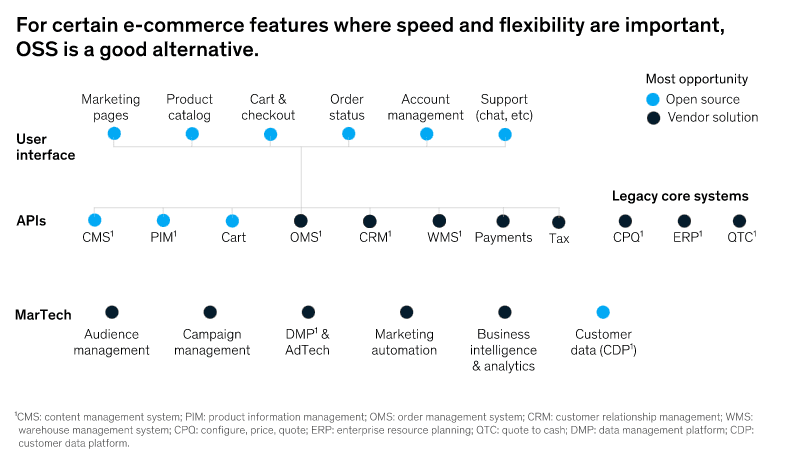
Open-source projects are often opposed to SaaS solutions that are ready to deploy regardless of professional knowledge or technical capabilities. The latter don’t make you worry about choosing a domain, hosting service or planning the process of development. So why do many companies still prefer open-source software? Keep on reading and we’ll sort it out.
Best open-source eCommerce platforms on the market today
Let’s compare eCommerce platforms with the open source using such criteria as their flexibility and scalability, security, built-in functionality, and the final cost of ownership (including hosting and development expenses).
Here’re top 12 open-source eCommerce softwares you should consider if you plan to go down this road. Check out the list and pick the best self-hosted eCommerce solution that will help your online business grow and flourish.
- nopCommerce
- Magento Open Source
- OpenCart
- WooCommerce
- PrestaShop
- Shopware
- Joomla
- OroCommerce
- Spree Commerce
- Drupal Commerce
- X-Cart
- Solidus
1. nopCommerce
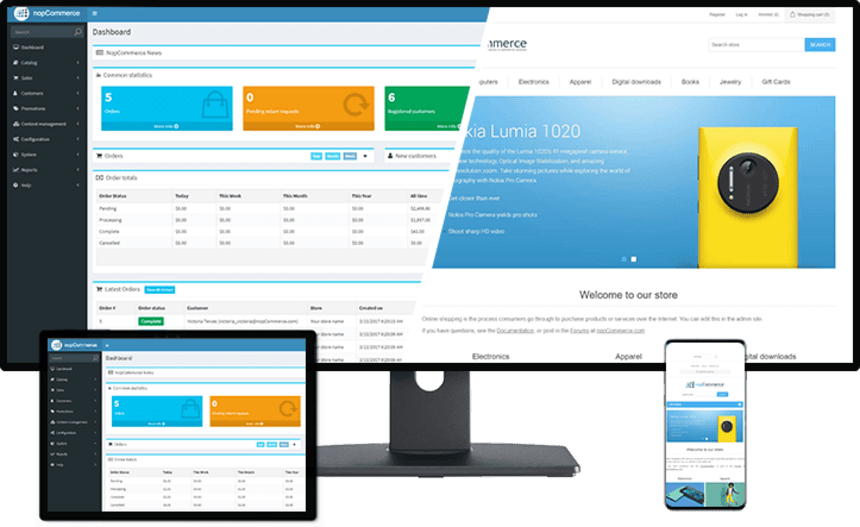
Many developers around the world rightfully consider nopCommerce to be the best open-source eCommerce software since it adheres to business needs and legal requirements adopted in various countries. The proof is 65,000 live stores currently powered by nopCommerce and a strong trend towards increasing their number each year.
In addition to a configurable shopping cart based on the best ASP.NET technologies and a catalog interface, the platform provides powerful sales and marketing options, including multi-store and multi-vendor, B2B, B2C and B2B2C support, dropshipping, multi-currency and multi-language, and many other out-of-the-box functions.
With nopCommerce, users can run several stores from a single installation, meaning that you can host more than one front-end store on different domains and manage them all from a single administration panel. The platform also allows to interact with any third-party services or mobile apps. Its adaptable architecture makes it simple to create customized functionality and design.
In addition, nopCommerce supports a headless approach through the Web API plugin. Developed by the core team, it allows users to interact with CMS, ERPs, PIMs, POS, custom front-end solutions, or mobile applications using REST. One of the biggest advantages is its customizability and adaptability thanks to the source code available.
nopCommerce offers the lowest ownership cost in the eCommerce sector and is, overall, safe, highly scalable, and free to download. You can actually own an online store rather than rent it on someone else's cloud by paying a monthly or annual fee. And if you need a reliable hosting for enterprise-level websites, you can build a custom infrastructure with Fully-managed Private Cloud Hosting services. There is also a pre-installed version for those who lack technical expertise and want to deploy their webshop without tedious edits.
Pros:
- Rich built-in functionality is absolutely free to use
- Frequent updates to the most recent version of the Microsoft.NET framework
- Enterprise-level functionality out-of-the-box (CRM, ERP, etc. integration, GDPR and PCI DSS compliance, wholesale functions, multi-store, multi-vendor & omnichannel, automatic tax calculation)
- For large eCommerce websites, it’s easy to set up load balancing and web farms. You can also connect to Redis to boost your site performance
- Advanced SEO features, including user-friendly URLs, canonicalization, sitemap, breadcrumbs, website analytics
- Extensive training materials, including certification and online courses Pluggable architecture with 1500+ plugins, integrations, themes and language packs
Cons:
- There aren't many design layouts available
- Simplified CMS management tools for rich content pages
- Unless you have extensive knowledge of online and database software, updating can be quite challenging.
What can make an eCommerce platform more accessible to potential customers? Of course, a responsive website design and user-friendly mobile app besides powerful built-in features. Open-source mobile builders enable you to create apps easily, efficiently and cost-effectively. Thanks to the available source code, they best fit an individual business rather than a made-for-all solution.
Despite knowing the benefits of having a mobile app for their online store, customers often step back because of some concerns - not enough time and technical resources; no clear understanding of website management and scaling, etc. nopCommerce is an open-source eCommerce platform with a mobile app. The latter gives you an enormous opportunity to develop a mobile presence not from scratch but still equipped with the desired features.
2. Magento Open Source

The Adobe Commerce Community Edition (formerly Magento Open Source) is a solid option for eСommerce store owners who are dedicated to the idea of a free platform, but want to have all the necessary features to build an online store from the ground up.
The eCommerce system is based on a PHP framework that allows the creation of scalable projects. With the Community Edition, you’ll get a built-in page builder, responsive website design, catalog management, integrated checkout, payment, and shipping, and a number of other helpful features. However, unlike Adobe Commerce, the open-source counterpart doesn’t get regular updates and technical support. If you want to have full access to B2B functionality or advanced marketing tools, the company aims at switching you to the paid version.
Pros:
- It is excellent for search engine optimization because it uses keywords and tags
- Lightweight platform, i.e. the website pages load quickly
- Support several extensions, including payment processing, order management, billing and customer communication
Cons:
- The open-source edition lacks the advanced features available in Adobe Commerce, like B2B suite, Adobe Cloud, technical support, etc.
- Doesn’t have any technical support for the open-source edition, meaning that you’ll have to settle down issues on your own or with the help of the community
View also: Magento vs nopCommerce: what to choose for your project and when
3. OpenCart

OpenCart is a popular open-source shopping cart software with a supportive and active professional community. With more than eight shipping options, 20 payment gateways, and hundreds of pre-built themes, the platform still has a user-friendly interface. eCommerce services are provided in more than 40 different languages. Small and medium-sized enterprises may find this solution appropriate for their operations due to its local and worldwide use.
Quick app installation and support for various extensions allow to create a full-fledged eCommerce store. A good side is that OpenCart can be deployed in most web hosting providers that offer one-click application installation. Although it is a lightweight system and uses fewer resources than Magento, it can only manage a given number of users and items, and does not guarantee a high level of speed. What’s more, OpenCart is a little outdated when compared to competitors.
Pros:
- Doesn’t require much technical knowledge
- More than 2,700 design themes to choose from
- Multi-currency & multiple language support
- Free add-ons and other integrations
Cons:
- The platform seems to be discontinued
- Limited SEO and marketing features
- Wholesale functionalities are not fine-tuned and require custom adjustments
- Despite high customizability, it is not always easy to make significant modifications without some coding experience
4. WooCommerce
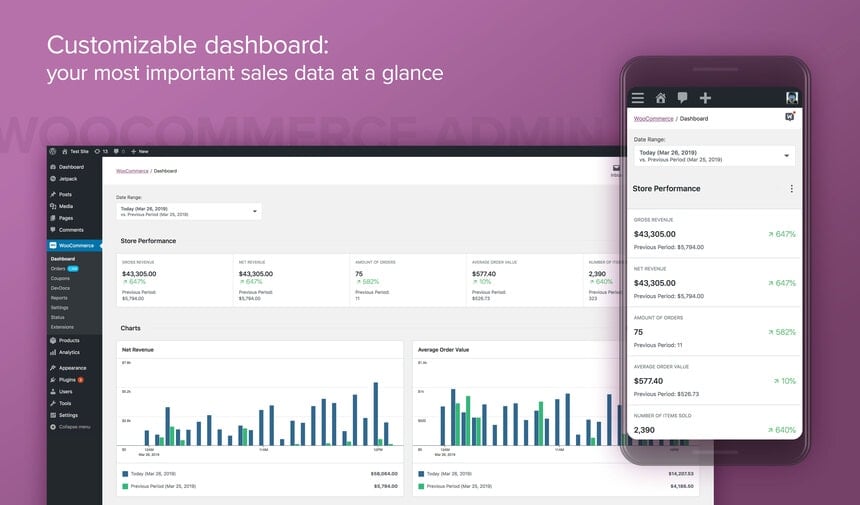
Due to its large target audience of WordPress users and small businesses who are familiar with this CMS, WooCommerce is one of the most popular eCommerce platforms. Installing the shopping cart plugin, running it, and configuring it to any specifications is quite easy using setup wizards. By the way, WooCommerce can be installed with only one click if you're utilizing Cloudways. After that, the administrator can manage all items' settings, add-ons, orders, coupons, reports, inventory, linked products, shipping, and categories.
If you couldn't find the necessary feature installed by default, it's likely that there’s an additional extension available at the marketplace. Through multiple plugins, WooCommerce grants access to blogging, SEO, and marketing tools. On the plus side, the platform itself is available to users without any setup or recurring fees. Although it offers more customization options than other hosted platforms, its security largely depends on the hosting provider (as well as the speed of your eCommerce website).
Pros:
- Easy updating because it is powered by WordPress and uses the plugin update architecture
- Straightforward integration with CMS systems and other third-party applications
- Convenient order management to keep track of product inventories, product variations, history, status, etc.
Cons:
- To create a visually appealing store, it’s necessary to set up all the other Wordpress components (for example, select a suitable Wordpress theme, install add-ons that do not conflict with each other, etc.)
- Expensive plugins and additional apps (insufficient out-of-the box features)
- Not the best solution for enterprise-level projects due to the restrictions of the WordPress architecture.
View also: nopCommerce vs. WooCommerce: differences in functionality and performance
5. PrestaShop

PrestaShop is yet another open-source eCommerce platform that is regularly updated, and extended with new themes and plugins. If you lack technical expertise, you can have access to a fully managed service that provides you with both hosting and maintenance - it might be more expensive than a custom installation but it works best for people without coding knowledge who still need the flexibility of open source.
One-page checkout, downloadable products, cross-selling features are just a few of the hundreds of features offered by PrestaShop. All in all, the platform provides more than 5000 modules and over 600 features, ranging from shipping and digital marketing to store back-end administration, but many extras come at an additional price. In addition, it’s better to use internal solutions because the software does not support a number of widely used integrations.
Pros:
- 3000+ mobile-optimized templates
- Doesn’t require extensive server resources
- A robust CRM tool for customer relationship management (different user groups, automated emails, etc.)
- Flexible product configuration and structured workflow for content generation
Cons:
- Not enough online documentation and difficult-to-understand user guides
- No dedicated technical support from the PrestaShop team
- Slow loading, which is bad for search engine optimization and site rankings.
6. Shopware
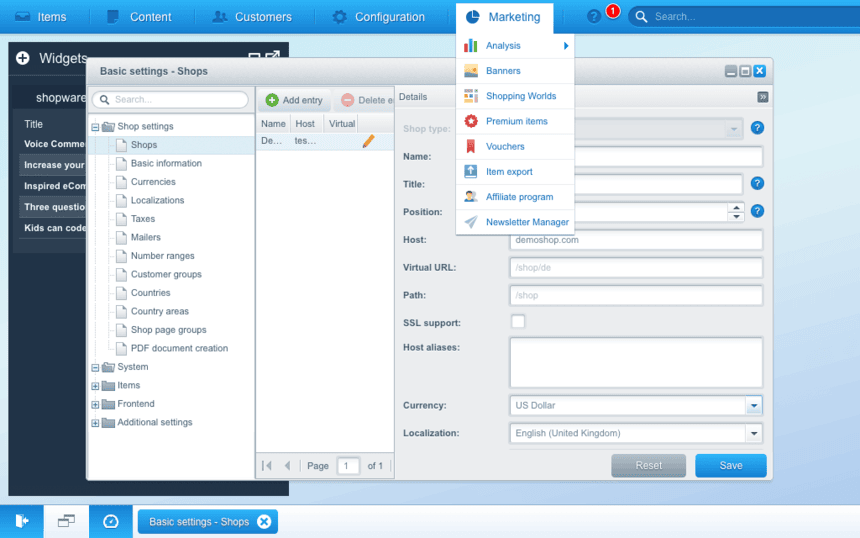
When compared to other platforms like Magento or WooCommerce, Shopware looks like a “dark horse”. Maybe it had been focusing on the German market before but now it seems to be ready to go global. Shopware's easy-to-use interface and low learning curve are two of its main selling points that can make it stand out.
Being an open-source eCommerce application, it delivers comprehensive user experiences and services through REST APIs, allowing administrators and developers to engage with the platform in the way that suits them best. The software regularly collects store input to help guide future development and better meet consumer needs.
This platform supports business modules for both B2C and B2B transactions. Additionally, the built-in plugin manager enables customers to expand the functionality with other tools and services (over 4,000 extensions available).
Pros:
- Almost no training is required to perform back-end configuration thanks to a simple drag and drop
- Flexible payment plans - from the Community and Starter editions to the Professional and Enterprise
Cons:
- In comparison with other “big names”, this platform lacks visibility and still needs to establish its brand on the global market
- The Shopware community is primarily German, therefore it might be difficult to find information and user reviews in English
- You’ll need a commercial version for larger projects, so if you're planning to develop a multi-store system, be prepared to pay for a license.
7. Joomla
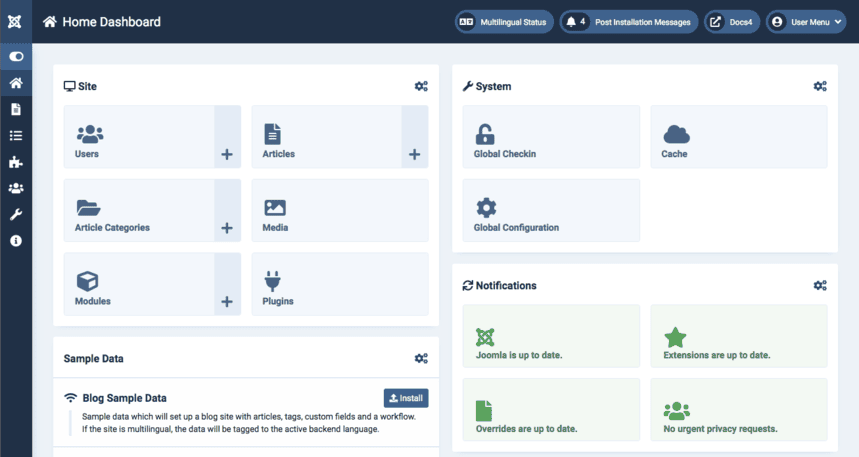
Joomla is the second-most popular open-source CMS but it can also be used for eCommerce purposes through an extension like WooCommerce for WordPress. This content management system is mostly used by company owners, schools, and churches as it offers sophisticated solutions for user administration and usage access restrictions.
The biggest advantage of Joomla is its adaptability for various sorts of content – modules and components provide enough flexibility for presenting non-standard formats. The marketplace for extensions also makes it simple to add more functionality to your online store. There are more than 6,000 options available, including directories, help desks, live chat, and shopping carts. Custom product catalogs, inventory control systems, and other features are all included in the basic open-source eCommerce framework.
Many businesses looking to go global will find that Joomla is a great option because it offers multilingual support for expanding worldwide. There are more enterprise tools available but few of them can offer the same degree of freedom.
Pros:
- Beginner-friendly configuration options and visual administration interfaces
- Vast content management capabilities to work with articles, tags, modules, menus, and display content in a different way using third-party integrations
- Better loading time and greater SEO potential than those features of WordPress, if you set up your website properly
Cons:
- Since it’s mostly a CMS, eCommerce functions are added through plugins and extensions, which can be quite expensive or difficult in technical terms
- Not the best option for mid- or large-sized businesses due to restrictions of the free version and limited customization of paid plugins
- Extremely limited SEO and marketing features.
8. OroCommerce
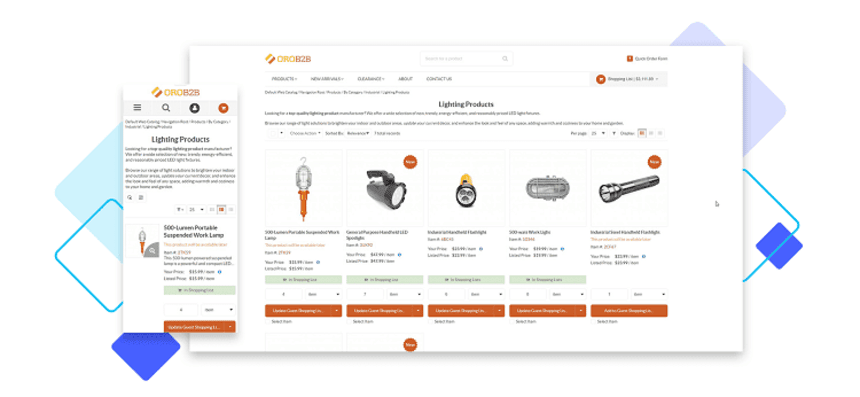
OroCommerce is an open-source B2B commerce platform made to integrate quickly with programs like ERP, CRM, and tools for product information management. All this is an essential part of boosting online business, enhancing customer satisfaction, and minimizing the total cost of ownership. In case you're interested in building a multi-vendor marketplace, there are many additional options on OroMarketplace.
In fact, OroCommerce is often called an excellent option for self-service websites, customer portals, and wholesale stores. For individuals who want to use the software without having to worry about their own hosting and installation, OroCommerce also provides a cloud-hosted version.
Pros:
- Pure focus on B2B functionality, with necessary extensions and integrations out-of-the-box
- Customer Satisfaction Algorithm, a behavior-based feature that assesses consumer responses and experiences to improve the platform
- Great ecosystem (ERP, PIM, CRM (included) for enterprise-level businesses
Cons:
- The steep learning curve for the customization of projects
- Practically unsuitable for smaller projects due to high development and maintenance costs
- Can work too slow in the local environment or don’t work in a new environment due to the lack of Docker support.
9. Spree Commerce
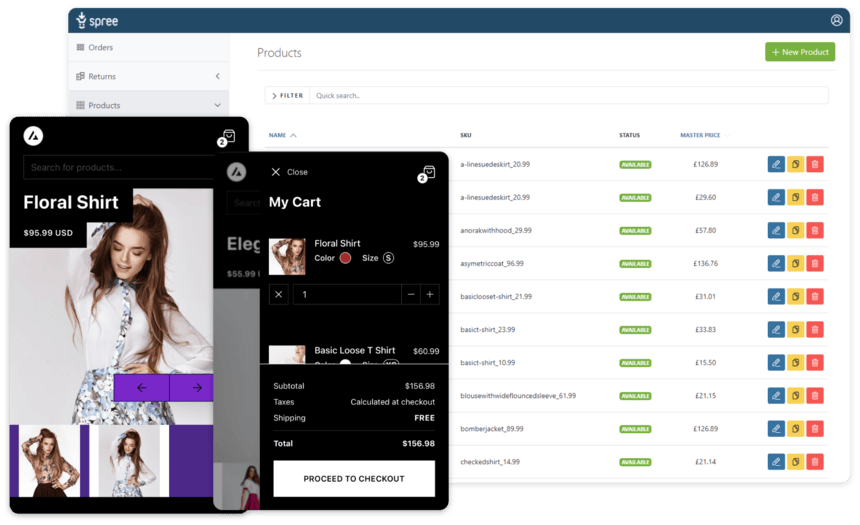
Spree Commerce is a headless eCommerce platform available as both open source and SaaS. While Spree as a Service gives you more capabilities and direct access to cloud hosting (on a subscription basis), the open source version is completely free but comes with less features. The core platform offers a variety of services, including inventory management systems, SEO tools, and an analytics dashboard.
Like any other open-source platform, the system needs to be manually installed and hosted. This indicates that you might need a specialized team to manage the storefront. It is also necessary to learn how to use and customize a number of the features independently. Sounds a little bit challenging, but if you know how to code or have the money to hire a developer who does, this platform will grow together with your business.
Pros:
- Lightweight, quick, and adaptable with a robust backend admin module
- Extremely customizable to create a special and adaptable shopping cart
- Quick and easy access to customer information, i.e. changing usernames and passwords is simple when solving login-related issues
- Spree Commerce can be a good option to manage several stores, launch your own multi-vendor marketplace, or work in the B2B sector
Cons:
- Small user and developer base, which makes the development and maintenance more expensive and challenging
- Not enough ready-made plugins, which stipulates the need to hire developers to create a necessary add-on from scratch.
10. Drupal Commerce
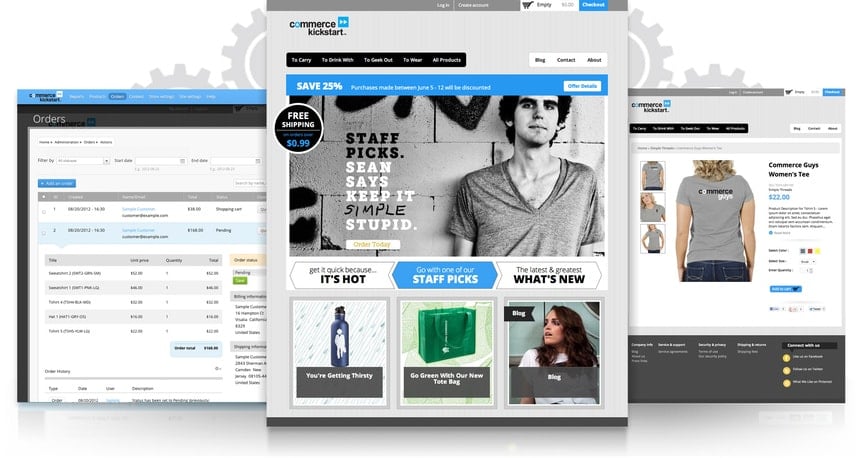
With Drupal Commerce, you have the power to choose from a variety of mobile-responsive themes and customize their design, look, and logic to create a unique online store. Based on the content management system, it provides a full administration system with a checkout form and multi-currency support. All in all, Drupal may be customized to fit the ever-changing needs and expectations of any size of commerce by integrating with third-party solutions.
Along with several shipping and payment methods, Drupal Commerce keeps an organized record of orders, receipts, payments, and invoices. It has a security mechanism of its own that is continuously upgraded. Drupal Commerce also helps in the optimization of your eCommerce website for search engines.
However, similar to many other open-source systems, you'll need to pay for support provided by Commerce Guys (the initial developer), which is quite pricey.
Pros:
- Multi-store support to control an extensive network of online stores with individual currencies, product kinds, and checkout processes
- Due to internal caching, Drupal is the fastest CMS if compared to competitors
- Prepared for adopting a headless eCommerce architecture thanks to smooth integration with GraphQ
Cons:
- High system demands and additional hosting fees
- Drupal was initially created with experts in mind, which makes it hard to master by less experienced developers.
View also: nopCommerce vs Drupal Commerce: which one is most suitable for your business?
11. X-Cart

X-Cart offers many features uncommon among other freemium shopping carts. Like its eCommerce alternatives, the platform comes with hosted and self-install options. The latter provides reliable hosting, design, and development help to make things simpler for non-technical people.
Despite the great feature list, upgrading can be quite expensive. To get the most of this eCommerce option, you'll need to manually code and use HTML, but there is plenty of room for customization if you have the time or professional team to do so. If you opt for the enterprise edition, you can have a free trial for the premium plan at $495 (one-time payment). On the plus side, there are no transaction fees within the platform.
Pros:
- Long-established history of the company and its product
- Zero transaction fees across all payment plans
- 24/7 technical support via phone, email, and live chat
Cons:
- Poor communication with tech support
- It is challenging to add new plugins in the way that X-Cart desires because there are no hooks. Each file must be changed individually.
12. Solidus

Solidus is among open-source eCommerce solutions that can operate as a headless eCommerce platform or as a monolithic platform (with the front-end and back-end separated). In other words, you can use an API to build new features and create new designs while also having access to the eCommerce capability.
The core eCommerce capabilities of Solidus focus on product management, payment methods, and logistics. In addition to the available modules, you may integrate with third-party logistics companies, payment services, and marketing platforms. Free extensions are created and maintained by other members of the Solidus community. However, if you want to be sure about the safety and performance of the integration, it’s better to choose official third-party add-ons.
Pros:
- Meets the requirements of larger eCommerce websites because it has a lot of default functionality and offers the freedom to add new features
- If you're looking to build a complex business and scale it out fast, then this might be the way to go
- Your dev team has a support line thanks to Solidus, which has set up a Slack channel for developers to always have access to support
Cons:
- It’s not as popular as other open-source eCommerce platforms
- If your budget is less than 30K, you should consider some other option
- Inventory/stock management involves a great deal of customization that many stores might not need. And if it is not implemented properly, scaling for really big storage can be challenging.
Summary: Choosing the best open-source eCommerce
With open-source eCommerce systems, you can fully personalize your website to all your needs and preferences. Some platforms can be used by people without any coding skills or beginner developers who seek a perfect training tool, while the others may be difficult and confusing to non-developers and aim at experienced teams working on full-fledged solutions. If some open-source projects are a “thing in itself”, the others come as a part of bigger enterprise editions and can naturally lack some crucial features.
So what are the best eCommerce platforms with open-source code? Which is the best open-source B2B eCommerce platform? Which is the most affordable solution? And which one is the most features-rich? Well, from the developer’s perspective it depends on your skills and goals as a store owner is more interested in other benefits - total cost of ownership, security and legal compliance, versatile payment methods, etc. So it’s better to choose a weapon of choice allowing you to create online stores of any complexity that grow together with the business they represent and are easy to customize at any stage of their life cycle.